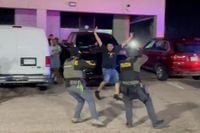In a dramatic early morning operation on April 27, 2025, more than 300 federal agents executed a raid on what the Drug Enforcement Administration (DEA) described as an "underground nightclub" in Colorado Springs, resulting in the arrest of at least 114 individuals. The raid, which commenced around 3:45 a.m., was a collaborative effort involving multiple federal agencies, including the FBI, Immigration and Customs Enforcement (ICE), the Bureau of Alcohol, Tobacco, Firearms, and Explosives (ATF), the IRS, the U.S. Army Criminal Investigation Division, and even the U.S. Postal Service, alongside local law enforcement, as reported by CBS News.
During the raid, agents seized firearms and a variety of drugs, including cocaine, methamphetamine, and a substance referred to as pink cocaine. The operation has drawn attention not only for its scale but also for the nature of the individuals involved. President Donald Trump publicly celebrated the action on Truth Social, asserting that it targeted "some of the worst people illegally in our Country — Drug Dealers, Murderers, and other Violent Criminals, of all shapes and sizes, and Judges don’t want to send them back to where they came from." Trump’s comments reflect his administration's ongoing focus on aggressive immigration enforcement.
Stephen Miller, Deputy White House chief of staff for policy and a key architect of Trump’s anti-immigration agenda, claimed the nightclub was associated with the Venezuelan gang Tren de Aragua. He elaborated on this assertion via a post on X, stating that the venue was known for its connections to this gang.
The DEA confirmed that a significant part of the operation involved the arrest of 114 illegal aliens, with agents placing patrons identified as being in the U.S. illegally on buses for processing and likely deportation. The agency also indicated that the raid was part of a broader strategy to dismantle criminal networks operating within the United States.
Attorney General Pam Bondi commended the raid, asserting that the nightclub was frequented not only by members of Tren de Aragua but also by individuals associated with the notorious MS-13 gang, which Bondi referred to as "terrorists." She added, "Cocaine, meth, and pink cocaine was seized. Two people were also arrested on existing warrants," highlighting the multifaceted nature of the operation.
According to law enforcement officials, over 200 individuals were present inside the nightclub at the time of the raid. Footage shared by the DEA depicted agents in tactical gear breaking windows as dozens of patrons attempted to flee the scene. Some were seen complying with orders from agents, raising their hands in surrender.
In a concerning twist, DEA officials revealed that active-duty U.S. military personnel were among those at the party, with some acting as patrons and others serving as private security. Jonathan Pullen, Special Agent in Charge of the DEA's Rocky Mountain Field Division, expressed alarm over the military's presence, stating, "It’s obviously concerning to have active duty military involved." He added that federal agents were collaborating with the Army’s Criminal Investigation Division to address the issue.
As the dust settled from the Colorado Springs raid, it became clear that this operation was part of a larger trend. The arrests followed a week of coordinated raids in Florida, where ICE, in partnership with local police, made nearly 800 arrests during what officials termed "Operation Tidal Wave." This operation was characterized as a "massive, multi-agency, immigration enforcement crackdown," and is seen as a precursor to similar actions nationwide.
Trump's administration has been actively deploying federal law enforcement agencies into communities across the U.S. to expedite the deportation process as part of a broader mass deportation strategy. The collaboration between ICE and local law enforcement is facilitated through the agency's 287(g) authority, which allows for the delegation of immigration-related arrests to local police. Florida has become a focal point for this initiative, with approximately 200 law enforcement agencies, including sheriff’s offices and city police departments, signing 287(g) agreements with ICE, the highest number of any state.
On Truth Social, Trump indicated that his administration plans to continue pursuing legal battles over the use of the Alien Enemies Act to expedite the deportation of alleged Tren de Aragua gang members. He warned that if his administration does not prevail in court, the country could face dire consequences, stating, "If we don’t win this battle at the Supreme Court, our Country, as we know it, is FINISHED! It will be a Crime ridden MESS."
In addition to the Colorado Springs raid, Trump addressed the recent arrest of Wisconsin judge Hannah Dugan, who has been accused of obstructing justice for allegedly directing an immigrant out of her courtroom to evade federal agents. Trump condemned the incident, saying, "What happened was terrible," and expressed his dismay that a judge could act in such a manner. He further emphasized the need to reclaim the country from what he described as criminals allowed to enter under the Biden administration, labeling them "world-class criminals and people that are insane, people from jails, murderers, drug addicts, drug dealers."
Trump's comments suggest a growing frustration with the legal system, which he perceives as an impediment to his deportation agenda. He insisted, "We have a country. We have to be proud of our country. We can't let these people stay, and the courts are allowing them to stay." The president expressed hope that the Supreme Court would intervene to support his administration's immigration policies.
The unfolding events in Colorado Springs and broader immigration enforcement efforts across the nation signal a pivotal moment in the Trump administration's approach to illegal immigration and crime, raising questions about the implications for civil liberties and community safety.




